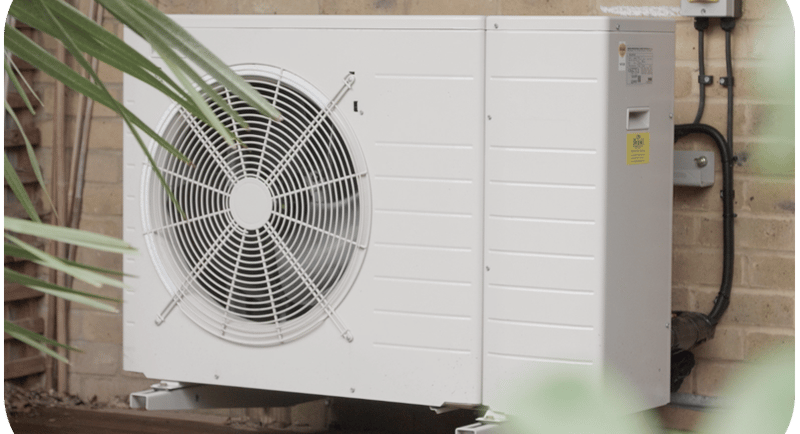Heat Pumps for Your Home or Business in the UK: Pros and Cons
In this blog post we look at the pro's and con's of heat pumps in the UK.
HEAT PUMPS


As the UK pushes towards its 2050 net-zero target, heat pumps are becoming a popular option for heating homes and businesses. They provide an eco-friendly alternative to traditional heating systems, like gas or oil boilers, by utilizing ambient heat from the air or ground. But are they the right choice for you? In this blog post, we'll explore the pros and cons of installing a heat pump in the UK, whether for a home or business.
What is a Heat Pump?
A heat pump is a system that transfers heat from the outside (air, ground, or water) into your property. Rather than generating heat by burning fuel, heat pumps extract and amplify existing thermal energy from nature, making them an energy-efficient option.
There are two main types commonly used in the UK:
Air Source Heat Pumps (ASHPs): Extract heat from the air.
Ground Source Heat Pumps (GSHPs): Extract heat from the ground.
The Pros of Heat Pumps
1. Energy Efficiency and Lower Running Costs
Heat pumps can be up to 300-400% efficient, meaning for every unit of electricity consumed, they can produce 3-4 units of heat. This is significantly more efficient than gas or electric heating, which operate at or below 100% efficiency. In the long run, this can lead to lower energy bills, especially if you currently rely on oil or electric heating.
2. Reduced Carbon Footprint
Switching to a heat pump can drastically cut your carbon emissions, as they don’t burn fossil fuels to generate heat. The UK's increasing reliance on renewable energy in electricity generation means the electricity that powers heat pumps is also becoming greener over time. This aligns well with the UK's commitment to reducing carbon emissions.
3. Eligibility for Government Incentives
In the UK, several incentive schemes are available to encourage the adoption of heat pumps. Under the Boiler Upgrade Scheme, homeowners and businesses can receive grants of up to £5,000 for installing air source heat pumps, or £6,000 for ground source heat pumps. These financial aids can significantly reduce the initial installation costs.
4. Versatile Usage: Heating & Cooling
Unlike conventional boilers, heat pumps can be used for both heating in winter and cooling in summer (similar to an air conditioner). This dual function makes them a versatile year-round solution for maintaining a comfortable indoor environment.
5. Low Maintenance
Once installed, heat pumps require very little maintenance compared to traditional heating systems like gas boilers. With a typical lifespan of around 15-25 years, they can last much longer than a gas boiler, providing reliability and durability.
The Cons of Heat Pumps
1. High Initial Costs
Although government grants help, the upfront cost of installing a heat pump can still be significant, particularly for ground source heat pumps which can cost between £10,000 and £25,000. Air source heat pumps are generally cheaper but still range from £7,000 to £13,000, depending on the size and complexity of the system.
2. Not Suitable for Every Building
Older buildings, or those with poor insulation, may not be ideal candidates for heat pumps. Heat pumps work best in well-insulated homes where heat loss is minimal. Retrofitting insulation to meet heat pump standards can be an additional cost. If your building is large or draughty, you may not get the full energy-saving benefits, and the system might struggle to maintain desired temperatures.
3. Lower Heat Output
Heat pumps typically provide heat at lower temperatures than conventional gas or oil boilers. This means you may need larger radiators or underfloor heating to effectively distribute heat around your home or business. In older homes, where radiators are smaller, this may require additional upgrades.
4. Installation Complexity
Installing a heat pump is more complicated than simply replacing a gas boiler. For ground source heat pumps, excavation is required to install pipes underground, which can be disruptive and require significant space. Air source heat pumps are easier to install but can still require planning permission, particularly in conservation areas.
5. Seasonal Performance Variations
While heat pumps are designed to work efficiently in the UK climate, their performance can dip during very cold weather, especially for air source models. At temperatures below freezing, air source heat pumps may struggle to extract enough heat from the air, reducing their efficiency and potentially increasing reliance on backup heating systems.
Is a Heat Pump Right for You?
For Homes:
If you live in a modern, well-insulated home or are willing to upgrade your insulation, a heat pump can offer long-term savings and reduced environmental impact. However, if you live in an older, poorly insulated home, the upfront costs and potential need for additional upgrades (like new radiators or underfloor heating) might outweigh the benefits.
For Businesses:
For businesses, especially those looking to improve sustainability and reduce carbon emissions, a heat pump can be a worthwhile investment. Larger commercial buildings may benefit more from ground source heat pumps, as they often have the space for the installation. For smaller businesses, air source heat pumps can be a good choice, though considerations about upfront costs and potential for planning permissions should be weighed.
Conclusion
Heat pumps are an eco-friendly and energy-efficient way to heat (and cool) your home or business, offering long-term savings on energy bills and reducing carbon emissions. However, the initial costs can be high, and the technology may not be suitable for all properties, particularly older, less energy-efficient buildings. Careful consideration of your property's insulation, budget, and long-term heating needs is crucial before making the switch.
For those able to invest in this green technology, heat pumps can be a step toward a more sustainable future, aligning with the UK's green energy goals.
Are You Thinking Of Changing Energy Providers?
Good news! Clicking the button below will send you to Octopus Energy UK for a quick quote, and if you sign up through this link you will share £100 with Marjorie!
That's £50 in your new account, and £50 in Marjorie's to help her with her heating cost this winter. Marjorie is 90, and any help with her heating will be forever remembered, and she will add you to her best friends list!
